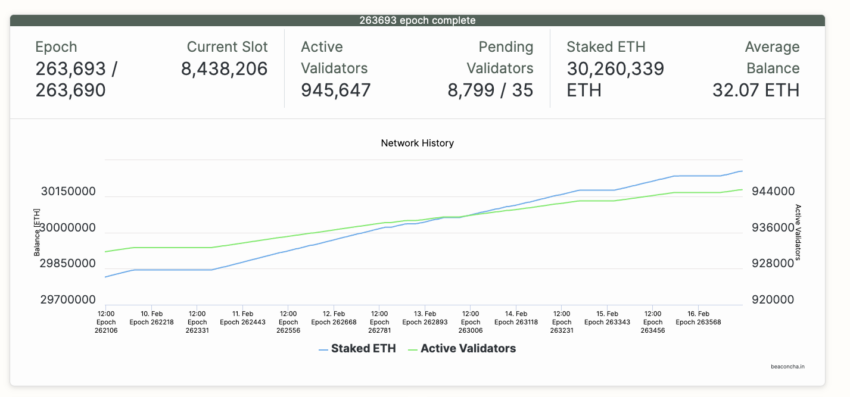Ethereum network’s altcoin king’s price is approaching $3,000 with about 9,000 validators in queue. The number of validators could reach one million with the restart of transactions following the Bitcoin halving event in April. According to Ethereum explorer data, there are 8,799 prospective validators that could bring the number of validators close to one million when added to the network. There are currently no validators considering leaving the network.
Intense Interest in Ethereum
Last week, the amount of Ethereum deposited into the network reached $1.24 billion. During the same period, the Ethereum network also added 12,741 nodes. The total number of active validators has now reached 945,647.

The so-called Ethereum merge update in 2022 changed Ethereum’s consensus mechanism from proof of work to proof of stake. This upgrade introduced validators, incentivized to secure the network in place of miners. Following this step, node validators can deposit 32 Ethereum to secure the network and earn crypto rewards.
Key Details About the Ethereum Ecosystem
Many validator candidates emerged amidst the rise of applications that could increase returns from staked Ethereum. These applications, known as restaking services, increase yields by restaking Ethereum invested in liquid staking services like Lido Finance and Ethereum. Crypto analyst and investor Miles Deutscher stated that restaking will be one of the various opportunities to achieve significant returns in 2024:
“Restaking is a form of staking that allows you to restake your Ethereum. That is, if you have staked your Ethereum in a liquid staking protocol like Lido, you can take this staked asset and restake it in another intermediary solution that provides you with additional yield, thereby essentially stacking yield on top of yield.”
Ethereum staking smart contract offers its validators an annual return of 4%. Those without the required amount can add their assets to a staking pool to earn rewards. Institutions can also generate income by staking Ethereum on behalf of their clients across multiple nodes. Such a move eliminates the hassle of installing Ethereum software on an individual’s computer. In return, companies can receive a small share of the rewards.









